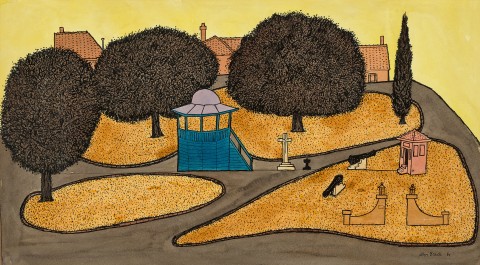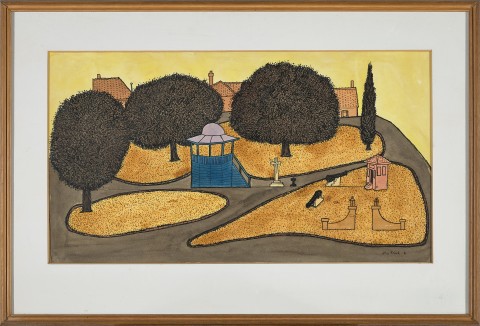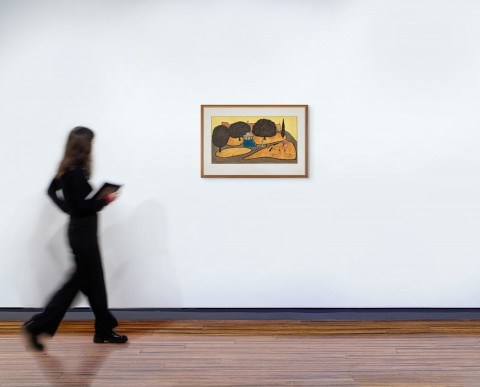THE SURREY GARDENS, 1961
JOHN BRACK
ink and watercolour on paper
40.0 x 73.0 cm
signed and dated lower right: John Brack 61
inscribed with title verso: The Surrey / Gardens
South Yarra Gallery, Melbourne
Clive Brown, Melbourne
Thence by descent
Maureen June Brown, Melbourne
Estate of the above
John Brack, South Yarra Gallery, Melbourne, August – September 1961, cat. 15
McCulloch, A., ‘Wilder side of Suburbia’, Herald, Melbourne, 16 August 1961
Millar, R., John Brack, Lansdowne Press, Melbourne, 1971, pp. 54, 56, 65, pl. 18 (illus.), 108
Grishin, S., The Art of John Brack, Oxford University Press, Melbourne, 1990, vol. 1, p. 84, vol. 2, cat. p102, p. 53
Lindsay, R., John Brack, A Retrospective Exhibition, National Gallery of Victoria, Melbourne, 1987, p. 121
Summer in the Suburbs, 1960, oil on canvas, 75.0 x 115.5 cm, in the collection of the University of Queensland, Brisbane
Study for ‘Roundelay’, 1964, ink and gouache, 45.8 x 91.5 cm, in the collection of the National Gallery of Victoria, Melbourne
Interviewed by Robert Hughes in 1959, John Brack declared, ‘National style is a thing of the past… I couldn’t care less about Australian Myths and Legends. I suppose bushrangers are very beautiful, but they bore me.’1 Emphasising his perspective on the type of subject matter that was relevant to a local, contemporary audience, Brack continued, ‘there’s only one true sort of Australian painting… and it consists of truthfully reflecting the life we see about us.’2
As a committed painter of modern life, Brack found the subjects of his art in his immediate surroundings, the suburbs and the city of Melbourne. His best-known paintings of 1950s Australia, such as The New House, 1953 (Art Gallery of New South Wales) and the iconic Collins St, 5p.m., 1955 (National Gallery of Victoria), are full of acute observations of contemporary living and, although seemingly humorous and ironic, such images were primarily motivated by an intense interest in people and the human condition, and the desire to produce an essentially humanist art. These subjects also offered Brack new artistic territory. As he explained, suburbia ‘almost seems to be the invention of Australia. It is a theme which hasn’t the disadvantage of having already been explored by painters better than oneself.’3
The Surrey Gardens, 1961 is one of a small group of works, including North Balwyn Tram Terminus, 1954 and The School, 1959, that depict subjects which were close to the artist’s home at the time and in this instance, just a short walk away. Located in Union Road in the Melbourne suburb of Surrey Hills, the Surrey Gardens were established in the first decade of the twentieth century. William Guilfoyle, the renowned botanist who famously designed Melbourne’s Royal Botanic Gardens, was consulted about the design and planting scheme.4 Brack was a skilled draughtsman and this work, which combines fine drawing in pen and ink with broad areas of watercolour wash, highlights both the precision of his technique and his careful observation of the world around him. He records the distinctive elements of the Gardens; a pair of cannons which commemorate the end of the Boer War in 1902; the memorial stone cross and cenotaph (with an ornamental Art Nouveau honour roll by wood-carver John Blogg) which were erected after the First World War; and the central rotunda, which was built in 1921 in memory of local resident John Gray. While Brack depicts Surrey Gardens devoid of people, it is a space that is redolent with the implications of human presence and activity. Indeed, the fact that there are no figures in the image only serves to emphasise the loss that is memorialised by these various structures.
The Surrey Gardens was exhibited in a 1961 solo exhibition at Violet Dulieu’s South Yarra Gallery and purchased by Clive Brown, whose family has retained it ever since. In his Age review of the exhibition, Alan McCulloch observed, ‘John Brack… views the case for life in suburbia with notable objectivity… as commentary Mr Brack’s art is right on the ball, the product of a highly intelligent observer or sufferer, depending on how you look at it.’5
1. Brack cited in Hughes, R., ‘Brack: Anti-Romantic Gad-Fly’ in The Observer, 21 March 1959, p. 182
2. ibid.
3. Brack cited in Tony Morphett (director), The Lively Arts: John Brack, ABC-TV documentary, Melbourne, 1965
4. See https://www.surreyhillsprogress.org.au/about-surrey-gardens-and-the-shrine
5. McCulloch, A., ‘Wilder side of suburbia’, The Age, Melbourne, 16 August 1961
KIRSTY GRANT


